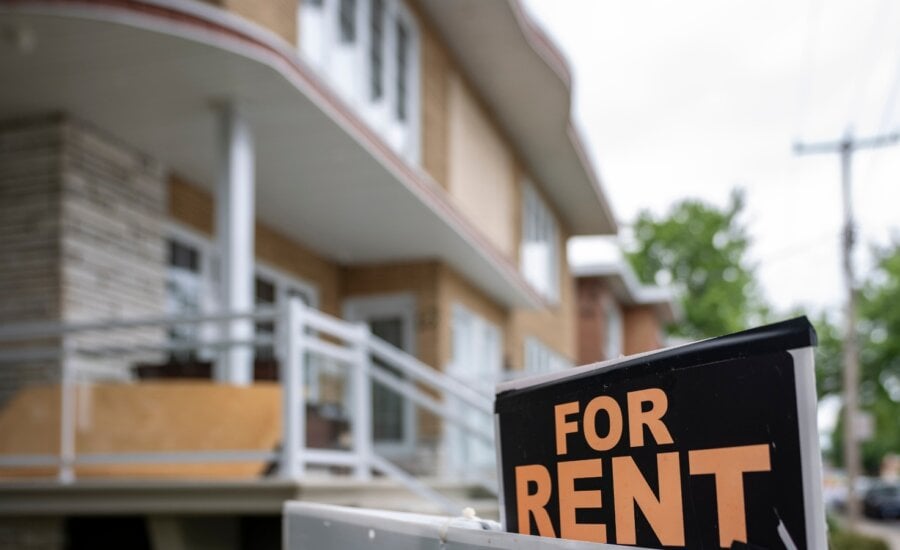How your rent payments can help build your credit history
Rent-reporting platforms let renters build credit by reporting on-time payments, helping first-time buyers and newcomers improve mortgage eligibility.
Advertisement
Rent-reporting platforms let renters build credit by reporting on-time payments, helping first-time buyers and newcomers improve mortgage eligibility.

Paying rent, much like a mortgage, can often be a person’s biggest monthly expense. Yet, there hasn’t historically been a way for renters to get credit for making these large payments on-time like homeowners. New rent-reporting platforms are aiming to change that. These platforms act as a liaison between renters and their landlords and a credit bureau so renters can build their credit history and improve their chances of qualifying for a mortgage when the time comes.
“Your rent is your biggest monthly obligation for debt payments so it’s unfair that it’s not counted towards building your credit,” said Viler Lika, founder and CEO of rental services company SingleKey.
Companies like SingleKey, Zenbase, Borrowell, and FrontLobby offer such rent-reporting services, with varying fees and requirements. SingleKey works with landlords and property managers across Canada and screens more than 15,000 rental applications every month. Landlords pay a $30 fee for a tenant screening report, and renters pay $8 per month to report their rent payments on the SingleKey platform.
“This is a very powerful tool for graduating towards home ownership as a renter because you’re demonstrating to the lender that you have the ability to pay a large amount,” Lika said.
The platform accommodates pauses in rent reporting too—when you might move back in with your parents, for example—without harming your credit.
In under 60 seconds, get matched with a personalized list of the best credit cards based on your spending personality and approval likelihood. No SIN required.
Lika believes rent reporting will make housing more accessible for renters while also reducing tenant delinquency risk for landlords. However, Alex Leduc, CEO and principal broker of Toronto-based mortgage brokerage firm Perch, cautions that such disclosure can come with its own set of concerns. “If [you] stop reporting, it would be a red flag to lenders and they would dig deeper,” he said. “And if [you] keep reporting and arrears show on [your] credit report, then [your] credit score would likely go down as a result.”
Leduc advises against opting into a rent-reporting program if you anticipate missing a payment or even paying a few days late. “Otherwise, you’re just shining a light on a poor repayment history that would’ve potentially gone unnoticed,” he said.
However, Leduc believes rent reporting can be beneficial especially for longtime renters, new immigrants, or aspiring homebuyers with little or no credit history. “Not having a credit score is a massive impediment to getting credit at all,” Leduc said. “When you’re trying to get a mortgage, you’re ultimately asking a lender to give you hundreds of thousands of dollars … They want to know you’ve managed credit successfully before.”
He said there are three key components to preparing a mortgage application: credit score, down payment, and income. And while a down payment can often be resolved—by receiving gifted funds from family, for example—having poor credit can be a “deal breaker.”
Money Mentors CEO Stacy Yanchuk Oleksy said credit ratings and credit scores are often misunderstood.
A credit rating is given for each of your credit products. It’s based on a scale of one to nine, with one being the best (meaning you’re at least making minimum payments on your credit card, for example). As you miss payments, you go up the scale. A credit rating of nine would indicate a debt in collection or even bankruptcy.
All of this information contributes to your credit score—a three-digit number from 300 to 900 that’s used as a predictor of how likely you are to pay back your debts. The higher the score, the more “credit worthy” you are.
Oleksy ,who is also a certified credit counsellor, said there are often misconceptions about what builds and harms your credit score. Being granted a high credit limit on your credit card, for example—even if you pay it off in full every month—can actually be disadvantageous, she said. “When your credit score is calculated, it looks at all that available credit and says that’s debt because [theoretically] you could go out to town tomorrow [and spend it].”
Share this article Share on Facebook Share on Twitter Share on Linkedin Share on Reddit Share on Email